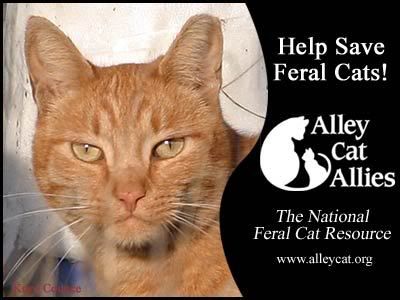 Feral cats need our help and protection. As you may know, feral cats are domestic cats that have reverted to a wild state. They are afraid of humans, and live in the shadows in urban and rural areas, scrapping out a bare existence. Sadly, many communities deal with feral cats by trapping them and destroying them, which is hardly a humane solution. A far better and more humane solution to control feral cat populations is trap, neuter, return. To learn more about trap, neuter, return (TNR), please visit Alley Cat Allies.
Feral cats need our help and protection. As you may know, feral cats are domestic cats that have reverted to a wild state. They are afraid of humans, and live in the shadows in urban and rural areas, scrapping out a bare existence. Sadly, many communities deal with feral cats by trapping them and destroying them, which is hardly a humane solution. A far better and more humane solution to control feral cat populations is trap, neuter, return. To learn more about trap, neuter, return (TNR), please visit Alley Cat Allies.
I recently received an email regarding a colony of feral cats located in the rural community of Burns Flat, Oklahoma. These cats are located on private property, and the property owners have demanded that the cats be removed, or they will be killed. A local rescue organization has teamed up with Forever Friends Humane Society to help these cats.
Forever Friends will trap, neuter, and relocate all the cats to barn homes, and take any adoptable cats into their adoption program. They have been offered a great deal with the VAW SPOT clinic to neuter all these cats. There are approximately 50 cats, and all can be neutered/spayed and vaccinated for rabies for about $750.00.
Forever Friends Humane Society has set up a campaign on Fundable. If you're not familiar with Fundable, donors pledge a certain amount of money. If the campaign reaches its goal by the deadline set by the organization, the money is then collected. If the goal is not reached, no money is collected. Foreover Friends and the feral cats desperately need you to pitch in to help reach their goal of $750.00. The deadline to raise this money is November 5, 2008. Foreover Friends is a 501(c)3 charity, so all donations are tax deductible. Please click here to donate!
I pitched in, will you??
Sunday, October 19, 2008
Help Feral Cats in Burns Flat, Oklahoma
Posted by
Meadow and Her Kitties
at
12:11 PM
3
comments
![]()
![]()
Labels: alley cat allies, donate, feral cats, Forever Friends Humane Society, fundable
Saturday, January 19, 2008
Feral Cats and Alley Cat Allies
Just because he's feral, doesn't mean he has no friends.
Most communities have large populations of stray cats and kittens. Some of these cats once belonged to someone, and have simply reverted to a wild state. Others, however, are feral. Feral cats were born in the wild and have never been socialized to humans. In essence, they are wild animals. Most adult feral cats cannot be domesticated and lead lives as normal, affectionate pets. However, feral kittens that are caught at an early age can often be socialized and lead great lives as pets.
Feral cat populations are a problem. They kill native bird species, they raid garbage cans, and they can spread diseases to your pet. BUT, the worst part of all is the tragic lives feral cats live. In urban areas, these cats depend on scavenging for human food scraps, and thousands starve to death when food supplies run low. They are killed by coyotes, by dogs, and in some parts of the U.S., by mountain lions. Their most dangerous predator, however, is humans. Thousands die on the roads when they are hit by cars. Others are killed when people poison them, shoot them, or worse. These animals lead a miserable existence.
Sadly, many communities have chosen to deal with feral cat populations by trapping them and killing them. Even in communities without a feral cat population control program, well-meaning individuals often trap feral cats and bring them to animal control facilities or humane societies. Bringing a feral cat to a shelter is almost a guaranteed death sentence. Feral cats are not socialized to humans and are generally not suitable as pets. Deemed "unadoptable" as soon as they come through the doors of a shelter, feral cats are almost always immediately euthanized.
There is a humane solution to the feral cat overpopulation problem called Trap-Neuter-Return, or TNR. TNR involves trapping feral cats, spaying or neutering them, and returning the to the area where they were trapped. Usually, the trapped cats are also vaccinated against rabies and other serious diseases. The released sterilized cats are then cared for by kind individuals who make sure they have enough food, water, and shelter to survive. By returning the sterilized cats to the location, the cats maintain their colony structure. Colonies protect their territories, keeping out newcomers and keeping a steady population. They also stop reproducing, allowing the colony to slowly die off as each individual cat dies due to natural causes. TNR also allows volunteers to trap kittens who may be young enough to be socialized and placed into homes. Stray cats and abandoned pets which are socialized to humans are also sorted out from the colonies and placed for adoption.
Cat owners can also help control the feral cat population. 1. Keep your cat indoors. If you live in an area where feral cats are exterminated, your cat may be mistaken for a feral and be killed. A cat allowed to roam outside is also at serious risk of being killed by wild animals, hit by cars, catching a disease, or being hurt or killed by cruel humans. 2. Spay or neuter your cats. If you have a female cat, and she gets outside even once unattended, she can come back pregnant. If you have a male cat, and he gets outside even once unattended, he can impregnate a female feral, perpetuating the problem.
More ways you can help:
1. Visit Alley Cat Allies to find out a wealth of information about humanely controlling feral cat populations.
2. Become a feral cat caretaker.
3. If you are feeding feral cats, have them spayed or neutered. Caretakers can often get free or reduced price veterinary services for the feral cats they care for.
4. Encourage your local lawmakers to adopt TNR as a means of controlling the feral cat population.
5. Spread the word!
Posted by
Meadow and Her Kitties
at
9:18 PM
0
comments
![]()
![]()
Labels: adopt a cat, alley cat allies, feral cats, humane society, rescue, save a life, shelter cat












































